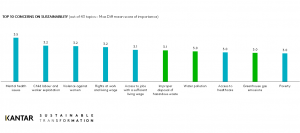
Social pressures are the leading sustainability issues affecting Australians in 2022
Kantar’s new Sustainability Sector Index reveals the imperative for brands to close the sustainability value-action gap and convert sustainable ambition into action for growth
Sydney, 9 November 2022: Social issues, led by mental health, work and economic pressures, comprise seven of the top 10 most important sustainability issues for Australian businesses to address today according to Kantar’s new 2022 Sustainability Sector Index. Over half of Australians think that brands have an important role in the social conversation about issues like gender equality, and race or immigrant relations (55%).

Aligning with the 17 UN Sustainable Development Goals, Kantar’s proprietary sustainability methodology measures the importance of issues to people overall against how much they associate them to specific sectors and categories. “Australians do see brands as having a right to play on issues relevant to their sector, but they’ll be very different per sector,” says Kantar Australia’s Head of Sustainability Bethan Hockey.
“We’ve mapped sustainability issues by stated importance in all major industries to help brands understand the issues that people see as most relevant and necessary to address, and those that can drive differentiation. Choosing where to play depends on the current status of your brand and the dynamics within its category. For example, in alcoholic beverages, people expect brands to be addressing issues around physical health, overconsumption and waste; but where brands can really drive cut through is in tackling issues around mental health and domestic violence.”
“However, just identifying the relevant issues is not enough to help consumers adapt their own personal behaviours to lead a more sustainable life,” adds Hockey. “Companies must understand the value-action gap – the difference between what people say they want to do to be more sustainable and the actions they’re actually taking. Addressing the fuels and frictions that influence consumer decision-making can help to overcome these gaps. The Sustainability Sector Index identifies what’s driving and what’s stopping people from adopting sustainable behaviours and what actions businesses can prioritise to close these gaps. For Australians, some of the biggest value-action gaps remain around sustainable products they want to be buying.
Kantar has also released its Digital (Dx) Analytics Sustainability Trends Report, providing AI-powered analysis of data on people’s actual sustainability-related searches interpreted through the framework of the Sustainability Sector Index, and augmented by desk research and profiling data.
“While the Sustainability Sector Index shows us the issues that consumers believe are most relevant for businesses to address, the Trends Report reveals the areas of sustainability that people are engaging with in their own lives,” adds Hockey.
From a social sustainability perspective, interest in understanding the symptoms of ‘burnout’ underlines the importance of businesses to support and consider the mental health of their teams and retention as fundamental to sustainability. For environmental search, ‘sustainability’ and the ‘circular economy’ are deeply linked terms, forming part of a broader conversation around waste in Australia.
“Circular economy searches are climbing, showing strong growth in the last two years and suggesting that this conversation will continue in Australia,” adds Hockey. “But it’s important to recognise that Australians are still seeking to understand the term. Brands that both define and demonstrate its meaning will thrive. As technology evolves and more green products are developed, brands can play a bigger role beyond the recycling of waste. Recycling is firmly established as a way Australians participate in the circular economy.”
Hockey emphasises that the overall challenge for businesses today is in converting their corporate sustainability strategies into clear brand actions that connect with Australians. “The Sustainability Sector Index reveals that over six in 10 Australians find it really hard to tell which products are good or bad ethically or for the environment (61%); while two in five don’t know where to find sustainable or ethical products (39%).
“Beyond the moral imperative, getting sustainability right is also fundamental to brand growth, especially during periods of disruption. It is no longer about if we should act, but instead about how. Our global Kantar BrandZ Sustainability Index demonstrates that the brands that consumers perceive to be more sustainable grew their total brand value by 31% in 2022 compared to 2021. This is significantly higher than the average Top 100 Most Valuable Global Brands, which grew at 23%.”
“But remember, not all people are on the same journey toward sustainable living for various reasons. Just tapping into the most active consumers is not sufficient to drive significant progress, impact and commercial value. You must talk to everyone to empower mass change and reap commercial rewards.”
-ends-
Information for editors
For more information or interviews, please e-mail: jeannie.duhigg@kantar.com. Discover more of Kantar’s sustainability thought leadership on the Kantar Australia Sustainability Hub.
About Kantar
Kantar is the world’s leading marketing data and analytics company. We have a complete, unique and rounded understanding of how people think, feel and act; globally and locally in over 90 markets. By combining the deep expertise of our people, our data resources and benchmarks, our innovative analytics and technology, we help our clients understand people and inspire growth.
About Kantar’s Sustainability Sector Index 2022
Kantar’s Sustainability Sector Index 2022 provide insights into evolving consumer attitudes to sustainability in 38 sectors across 32 countries and is based on more than 33,000 interviews.
About Kantar’s Digital Analytics Sustainability Trends Report
Using digital analytics, this report reveals global and Australian sustainability trends anchored to the rapidly evolving consumer context uncovered by using the speed and scale of big data, tech and AI.

